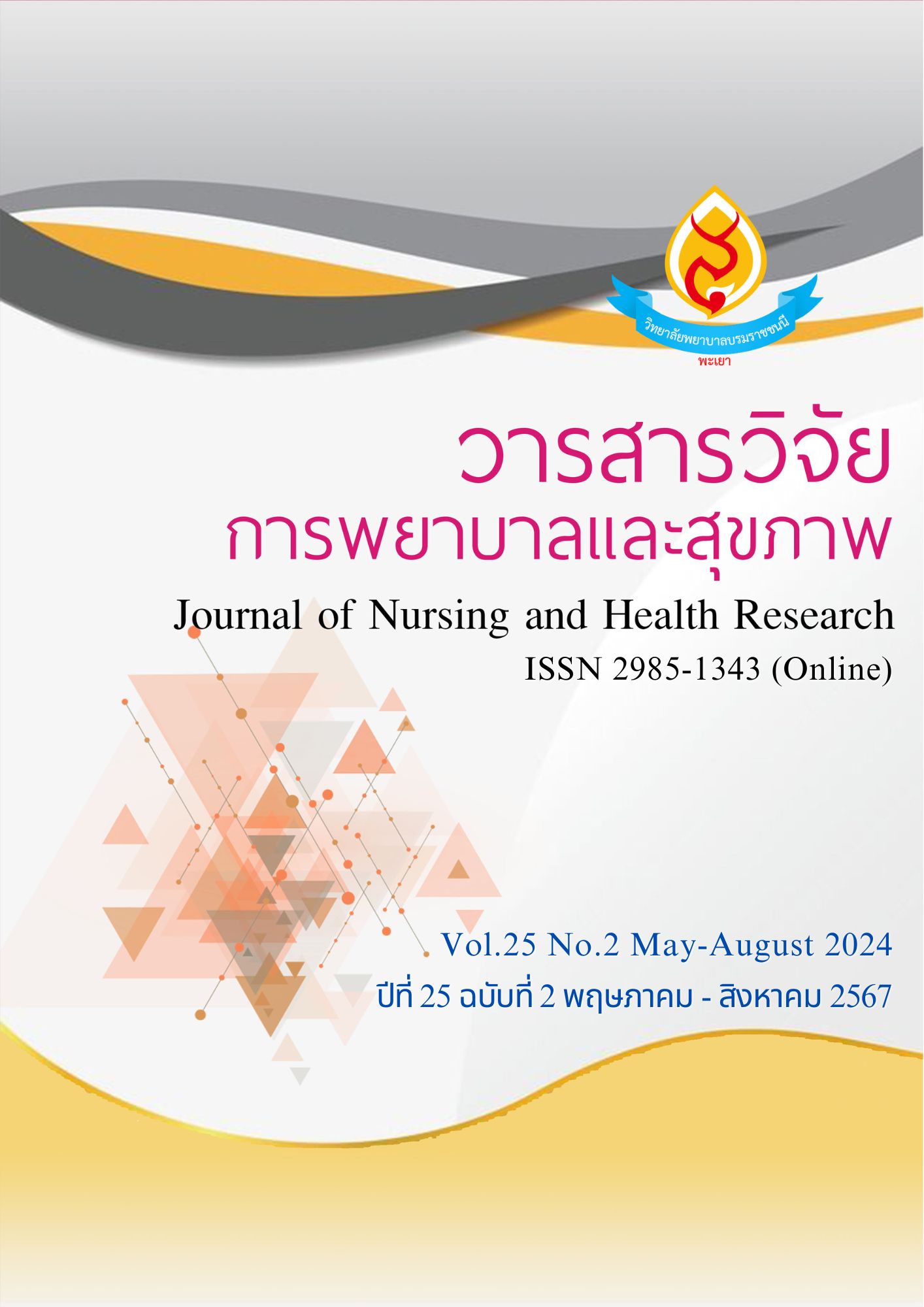การรับรู้ทุนทางจิตวิทยาเชิงบวกและปัจจัยที่เกี่ยวข้องกับการพัฒนา ทุนทางจิตวิทยาเชิงบวกในนักศึกษาพยาบาล
คำสำคัญ:
ทุนทางจิตวิทยาเชิงบวก, ปัจจัยส่งเสริม, อุปสรรค, นักศึกษาพยาบาลบทคัดย่อ
ทุนทางจิตวิทยาเชิงบวก เป็นคุณลักษณะและพัฒนาการของสภาวะจิตใจในทางบวกของบุคคลที่มีผลต่อสุขภาวะและความสำเร็จในชีวิต การศึกษานี้มีวัตถุประสงค์เพื่ออธิบายการรับรู้ทุนทางจิตวิทยาเชิงบวก รวมทั้งปัจจัย
ที่เกี่ยวข้องกับการพัฒนาทุนทางจิตวิทยาเชิงบวกในนักศึกษาพยาบาล ใช้วิธีการศึกษาเชิงคุณภาพแบบบรรยาย โดยการสัมภาษณ์แบบกึ่งมีโครงสร้าง ผู้ให้ข้อมูลเป็นนักศึกษาพยาบาลศาสตรบัณฑิต จำนวน 15 คน วิเคราะห์ข้อมูลด้วยวิธีวิเคราะห์เนื้อหา โดยกำหนดประเด็นหลักไว้สามประเด็น คือ 1) การรับรู้ทุนทางจิตวิทยาเชิงบวก 2) ปัจจัยส่งเสริมการพัฒนาทุนทางจิตวิทยาเชิงบวก และ 3) ปัจจัยที่เป็นอุปสรรคต่อการพัฒนาทุนทางจิตวิทยาเชิงบวก 1) ผลการวิเคราะห์ประเด็นหลัก การรับรู้ทุนทางจิตวิทยาเชิงบวก มี 2 ประเด็นรอง คือ การรับรู้จุดแข็งและจุดอ่อนของตนเองในมิติของทุนทางจิตวิทยาเชิงบวก และการเปลี่ยนแปลงของทุนทางจิตวิทยาเชิงบวก ประเด็นปัจจัยที่ส่งเสริมการพัฒนาทุนทางจิตวิทยาเชิงบวก ประกอบด้วย 6 ประเด็นรอง คือ การสนับสนุนและประคับประคองจากคนใกล้ชิด การเรียนรู้จากการลงมือกระทำ การเผชิญปัญหา และการจัดการความเครียด แรงจูงใจเพื่ออนาคตของตนเองและครอบครัว การเรียนรู้จากตัวแบบ และการปรับมุมมองและความคิด ส่วนปัจจัยที่เป็นอุปสรรคต่อการพัฒนาทุนทางจิตวิทยาเชิงบวก มี 3 ประเด็นรอง คือ ปฏิสัมพันธ์เชิงลบ การเผชิญปัญหาที่ไม่มีประสิทธิภาพ และการขาดความเชื่อมั่นในตนเอง ประเด็นเหล่านี้ จะเป็นประโยชน์ต่อการนำไปพัฒนารูปแบบในการพัฒนาทุนทางจิตวิทยาเชิงบวกที่เหมาะสมกับนักศึกษาพยาบาลต่อไป
เอกสารอ้างอิง
Azeez, A., & Dubey, A. (2023). Resilience: a comprehensive review of the concept. Journal of Korean Academy of Psychiatric and Mental Health Nursing, 5(4), 926–936. https://www.researchgate.net/publication/377808378_RESILIENCE_A_COMPREHENSIVE_REVIEW_OF_THE_CONCEPT
Bandura, A. (1997). Self-efficacy: The exercise of control. W.H Freeman and Company.
Chaleoykitti, S., Poonperm R., Srichum, D. & Pommal, W. (2021). Applying positive psychological capital for improving nursing students’ capacity to pass nursing license examination. Journal of the Police Nurses, 13(2); 464-472. (in Thai)
Chonprai, C., Phattrarayuttawat, S., & Ngamthipwatthana, T. (2014, March 28). Psychological Capital and Mental Health in Students of Chulalongkorn University’s Residence [Paper presentation]. The 15th Graduate Research Conferences, Khon Kaen University, Thailand. https://gsbooks.gs.kku.ac.th/57/grc15/files/mmp85.pdf
Chulalongkorn University. (2023). Emerging diseases Dangerous germs spread from animals to people. Thai Rath Archives. (in Thai). https://www.chula.ac.th/clipping/77653/
Cimen, I. & Özgan, H. (2018). Contributing and damaging factors related to the psychological capital of teachers: A qualitative analysis. Issues in Educational Research, 28(2), ii–v. https://search.informit.org/doi/10.3316/informit.672959780967872
Gupta, P., De, N., Hati, S., Saikia, C., & Karmakar, R. (2019). The relationship between positive psychological capital and coping styles: a study on young adults. Psychology, 10(12), 1649–1662. https://doi.org/10.4236/psych.2019.1012109
Horan, KM. (2022). Burnout and psychological capital in baccalaureate nursing students enrolled in clinical rotations. [Doctor of Philosophy in Nursing]. Seton Hall University. https://scholarship.shu.edu/cgi/viewcontent.cgi?article=4103&context=dissertations
Huang, Y., Cai, X., Li, H., Niu, Z., & Cai, X. (2023). exploring the factors influencing the psychological conditions of college students with financial difficulties based on structural equation modeling. In Bob, F., Chuan, Z., Marcus, T. A., Proceedings of the 2022 3rd International Conference on Artificial Intelligence and Education (IC-ICAIE 2022) (pp.1069–1077). South China Normal University. https://doi.org/10.2991/978-94-6463-040-4_161
Jackson, T. (2020). Reframing: coping strategies for resilient leaders. Medium. https://medium.com/@jacksonlead/reframing-coping-strategies-for-resilient-leaders-eed62b2ce3c6
Kongman, K., Hakeem, C. (2020). Factors affecting mental health problems of nursing students. Journal of The Royal Thai Army Nurses. 22(3), 331–339. (in Thai)
Krasikova, D.V., Lester, P.B., & Harms, P.D. (2015). Effects of psychological capital on mental health and substance abuse. Journal of Leadership & Organizational Studies, 22(3), 280–291. https://doi.org/10.1177/1548051815585853
Lambert, V.A. & Lambert, C. E. (2012). Qualitative descriptive research: an acceptable design. The Pacific Rim International Journal of Nursing Research, 16(4), 255-256.
Luthans, F. (2002). The need for and meaning of positive organizational behavior. Journal of Organizational Behavior, 23(6): 695–706. https://doi 10.1002/job.165
Luthans F., Avolio B. J., Avey J. B., & Norman S. M. (2007). Positive psychological capital: Measurement and relationship with performance and satisfaction. Personnel Psychology, 60(3), 541–572. https://doi.org/10.1111/j.1744-6570.2007.00083.x
Luthans, F., Youssef, C. M., & Avolio, B. J. (2007). Psychological capital: Developing the human competitive edge. Oxford University Press.
Mokekhaow, K., Sukrapat, W., & Promla, W. (2021). Factors related to stress of nursing students. Journal of Nursing Science and Health, 44(2), 60-71.
Mutluri, A., & Dhar, U. (2021). Predictors and consequences of resilience: an in-depth review, AIMS Journal of Management, 7(1), 98-113. https://www.researchgate.net/publication/355357420_Predictors_and_Consequences_of_Resilience_An_In-depth_Review
Office of National Economic and Social Development Council. (2024). National economic and social development plan 13th (2023-2027). https://www.nesdc.go.th/download/Plan13/Doc/Plan13_Final.pdf
Ohlin, B. (2017, June 7). Psycap 101: your guide to increase psychological capital. Positive Psychology. https://positivepsychology.com/psychological-capital-psycap/
Rad, M., Shomoossi, N., Rakhshani, M. H., & Sabzevari, M. T. (2017). Psychological capital and academic burnout in students of clinical majors in Iran. Acta Facultatis Medicae Naissensis, 34(4), 311–319. https://doi.org/10.1515/afmnai-2017-0035
Rodrigues, RICV., Carochinho, JB., & Rendeiro, MMO. (2017). The impact of positive psychological capital on the psychological distress of primary and secondary education teachers. PSIQUE, 13, 40-56. https://cip.autonoma.pt/wp-content/uploads/2020/11/The-impact-of-positive-psychological-capital-on-psychological-distress-of-primary.pdf
Sandelowski, M. (2000). Whatever happened to qualitative description?. Research in Nursing & Health, 23(4), 334 - 340. https://onlinelibrary.wiley.com/doi/pdf/10.1002/1098-240X%28200008%2923%3A4%3C334%3A%3AAID-NUR9%3E3.0.CO%3B2-G
Seligman, M. E. P. (2002). Positive psychology, positive prevention, and positive therapy. In C. R. Snyder & S. J. Lopez (Eds.). Handbook of positive psychology (pp. 3–9). Oxford University Press.
Sihawong, S., Phoongdee, N., Yanarom, N., Noinang, N., Anai, N., Bunchuen, T., Jodnok, T., Suriyasarn, T., Phoyan, T. (2018). Factors causing to stress of nursing students, Ubon Ratchathani University. ournal of Health Sciences and Wellness, 21(42), 93-101. (in Thai)
Sutheewasinnon, P. & Pasunon, P. (2016). Sampling strategies for qualitative research, Parichart Journal, 29(2): 31 - 48. (in Thai)
Thinuan, P., Siviroj, P., Barry, C. D., Gordon, S. C., Lerttrakarnnon, P., & Lorga, T. (2019). Narratives of older persons’ frailty and physical activity in relation to environmental landscapes and time. International Journal of Older People Nursing, 15(2). https://doi.org/10.1111/opn.12298
Tongsawang, K., (2017). The Relationships between the personal factors, stress, emotional intelligence and academic achievement of the students at Faculty of Nursing, Chaiyaphum Rajabhat University. Journal of The Royal Thai Army Nurses, 18(2), 91–100. (in Thai) https://he01.tci-thaijo.org/index.php/JRTAN/article/view/96848/75506
Vora, P., & Sivaraman, S. (2023). A study on factors affecting psychological capital in employed LGBTQ+ individuals. Annals of Indian Psychiatry, 7(2), 92. https://doi.org/10.4103/aip.aip_115_23
ดาวน์โหลด
เผยแพร่แล้ว
รูปแบบการอ้างอิง
ฉบับ
ประเภทบทความ
สัญญาอนุญาต
ลิขสิทธิ์ (c) 2024 วารสารวิจัยการพยาบาลและสุขภาพ

อนุญาตภายใต้เงื่อนไข Creative Commons Attribution-NonCommercial-NoDerivatives 4.0 International License.



